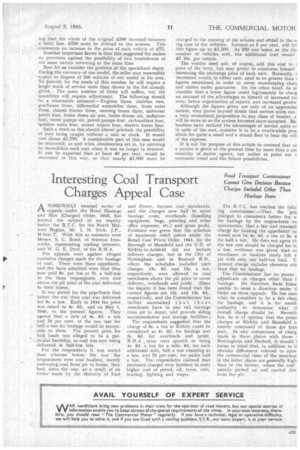Interesting Coal Transport Charges Appeal Case
Page 25

If you've noticed an error in this article please click here to report it so we can fix it.
ASOMEWHAT unusual series "of appeals under the Road Haulage and Hire (Charges) Order, 1942, has formed the subject of an inquiry • before the R.T.C. for the North Midland Region, Mr. T. H. Stirk, J.P., M.Inst.T. With him as assessors were Messrs. S. C. Bond, of Stanton Ironworks, representing trading interests, and W. G. E. Dyer, of the R.FT.A.
The aripeals were against alleged excessive charges made for the haulage of coal. There were three appellants, and the facts admitted were that they now paid 8s. per ton or 7s. a half-ton to the three responslents, over and above the pit price of the coal delivered to their homes.
It wa..i stated for the appellants that before the war their coal was delivered for 3s. a ton. Early in 1944 the price was raised to 4s. 6d., and on May 1, 1945, to the present figures. They agreed that a rate of 4S. 6d. a ton and 75 per cents of the ton rate for half a ton for haulage would be acceptable to them. The present price for half loads was alleged to be a particular hardship, as coal was now being delivered in half-ton lots.
For the respondents it was stated that whereas before the war the respondents were coal hauliers, merely conveying coal from pit to house, they had, since the war, asa result of an Order made by the Ministty. of Fuel and Power, become coal merchants, and the charges now hadto cover haulage costs, overheads (handling equipment, bags, printing and other office expenses, etc.) and gross profit. Evidence was given that the schedule of maximum retail prices under the Retail Coal Prices Order, 1941, for the Borough of Mansfield and the V.D. of Kirkby-in-Ashfield did not include delivery charges, but in the City of Nottingham and in Basford RD., where the schedules included such charges, 13s. 6d. and 16s. a ton, respectively, were allowed to coal merchants above the pit price to cover delivery, overheads and profit. (Since the inquiry it has been found that the correct figures are 12s. and 13s. 6d.., respectively, and the Commissioner has further ascertained that these merchants have to pay rail carriage from pit to depot, and provide siding accommodation and storage facilities.) The respondents suggested that the charge of 8s. a ton in Kirkby could be considered as 4s. 6c1. for haulage and 3s. 6d. for overheads and profit. R.H.A.„ rates were quoted as being 4s. 6d. a ton for a mile, 6d. for each additional mile, half a ton counting as a ton, and 75 per, cent. for under half a ton. The respondents claimed that increased charges were justified t meet higher cost of petrol. oil, _tyres, rent,
heating, lighting and wages. •
The R:r.c. has reached the follo. log conclusions :—That the pric charged to consumers before the w for haulage by the respondents we uneconomic, that a fair and reasonat charge for hauling the appellants' co would now be 4s. 6d. a ton or 3s. 4 for half a ton. He does not agree th the ton rate should he charged for liss a ton; evidence was given that co merchants •or hauliers rarely left t; pit with only one half-ton load. T1 present charge includes elements oth than that for haulage.
The Commissioner, has no power adjudicate on charges other than f haulage. He therefore finds Mins( unable to issue a direction under tl Order on these appeals. He has stab what he considers to be a fair char1 for haulage, and it is for anot authority to determine what tl overall charge should be. Neverth less, he is of opinion that the preset charges at Kirkby and Mansfield a mainly composed of those for t.ran port._ In any comparison of charg made • in these places with those i Nottingham and Basford, it should 1 borne in Mind that, in addition to ti obviobs differences referred toabov the commercial risks of the merchan in the latter places are generally high, than _in the farmer, where the coal usually picked up and carried dire from the pit.




















































